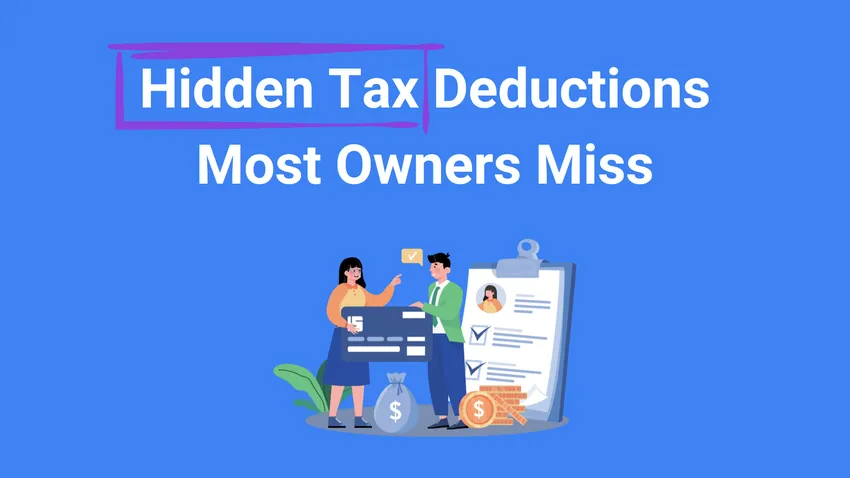Restaurant Tax Deductions: 3 Key Takeaways
- The Work Opportunity Tax Credit saves up to 40% on first-year wages for eligible new hires through December 31, 2025.
- Equipment and property upgrades qualify for 80% bonus depreciation in 2025, putting major tax savings within reach.
- Small restaurants may claim healthcare tax credits up to 50% of premium costs, plus still deduct what’s left.
Restaurant tax deductions can make or break your bottom line — yet thousands of dollars go unclaimed every year.
From equipment depreciation to wage and healthcare credits, these tax breaks are real, time-sensitive, and built to support restaurant owners like you.
With the right strategy, you can hold onto more of your hard-earned revenue and stay ahead of rising costs.
In this guide, we’ll walk you through exactly how to take full advantage of every deduction available in 2025 — without leaving a dime on the table.
Understanding Restaurant Tax Deductions
Tax compliance for restaurants demands more than just basic bookkeeping.
Your restaurant's success depends on mastering the specific tax requirements unique to the food service industry.
Income types to track
The IRS expects restaurant owners to maintain detailed records across multiple revenue streams.
Here's what your tracking system must cover:
- Regular food and beverage sales
- Credit card tips reported by employees
- Cash tips (when exceeding $20 per month per employee)
- Service charges added for large parties
- Gift card sales (which can be reported using three IRS-approved methods)
Tip reporting deserves extra attention. Your employees need to submit their tip reports by the 10th of each month.
The IRS also requires total reported tips to match at least 8% of your gross receipts per pay period.
Common filing mistakes
Restaurant owners often fall into costly tax traps. Using personal credit cards for business expenses tops the list of common mistakes.
Missing estimated tax payments when you'll owe $1,000 or more leads to unnecessary penalties.
Cash-heavy restaurants draw extra attention from the IRS. Your best defense? Rock-solid documentation.
Save every receipt, invoice, payroll report and inventory record for three years minimum.
Worker classification mistakes pack an expensive punch. Mislabeling employees as independent contractors brings hefty penalties and back taxes.
The same goes for payroll tax errors — Medicare and Social Security withholdings need precise handling to avoid IRS problems.
Property and Space Tax Deductions for Restaurant Owners
Your restaurant's biggest tax savings often hide in property-related expenses.
The right approach to deductions for renovations, rent and utilities could put thousands back into your business account.
Renovation costs
Restaurant owners get a special advantage — accelerated 15-year depreciation instead of waiting 39 years.
Your renovation budget stretches further with a 50% bonus deduction on new furniture, kitchen equipment and non-structural updates.
The IRS treats certain upgrades differently. Adding wheelchair ramps or drive-through windows?
These count as capital improvements. You'll need to spread these deductions across multiple tax years rather than claiming them all at once.
Rent and utilities
The rent check you write each month counts as a full business deduction.
One catch — the IRS watches for "unreasonable rents" above market rates, especially between related parties.
Your basic operating costs qualify for tax deductions too:
- Gas and electricity expenses
- Water and waste removal costs
- Phone and internet services
- Regular equipment maintenance
Safe harbor rules
The IRS safe harbor rule saves restaurant owners time and money. You can write off 75% of qualified remodel costs right away, while spreading the remaining 25% over time.
The rules? Your restaurant needs certified financial statements and must use over half its space for food prep and customer seating.
This applies to updates that keep your restaurant modern, boost efficiency or better serve your customer base.
The best part? No more headaches trying to sort which costs to deduct now versus later.
Property and Space Tax Deductions for Restaurant Owners
Smart restaurant owners know tax savings go beyond building costs.
Employee-related tax breaks offer substantial money-saving opportunities most restaurants miss each year.
Tip reporting benefits
The FICA tip credit puts money back in restaurant owners' pockets.
You'll get credit against federal income tax for Social Security and Medicare taxes paid on employee tips.
This applies when tips exceed $5.15 per hour of federal minimum wage.
Proper documentation matters here. Your employees must report tips of $20 or more monthly by the 10th of the next month.
Remember — service charges don't count as tips for the FICA credit, the IRS treats them as regular wages.
Healthcare deductions
Your restaurant could qualify for healthcare tax credits worth up to 50% of what you pay for employee premiums.
Here's what you need:
- Fewer than 25 full-time equivalent staff members
- Average wages below $62,000 per year
- Payment of at least 50% for employee-only coverage
- Health plans through SHOP Marketplace
The math works in favor of smaller restaurants — fewer employees mean bigger potential credits.
Plus, you can still deduct premium payments that exceed your credit amount.
Health Reimbursement Arrangements (HRAs) offer another tax-smart option.
These plans let you reimburse employee healthcare costs tax-free while keeping control of spending.
Better yet, health benefits help you build the reliable staff your restaurant needs to succeed.
Employee-Related Restaurant Tax Deductions You Might Be Missing
The timing of your tax decisions shapes your restaurant's bottom line.
Smart seasonal planning helps you maximize deductions while keeping more money in your business throughout the year.
Slow season write-offs
Quiet periods offer perfect opportunities for tax-smart moves.
Your restaurant can delay optional expenses and work with suppliers on payment terms to protect cash flow.
Use this downtime wisely — review your books and spot chances to save on taxes.
Food waste hits restaurants hard during slow seasons. Track spoilage carefully — these losses count as tax deductions.
The slow season also presents the perfect time for staff training or facility improvements.
These expenses reduce your tax bill while preparing your restaurant for busier days ahead.
Peak season preparations
Busy season success starts with bulletproof documentation. Save every receipt, bank statement and payroll record.
Well-organized records make tax season smoother and help you claim every deduction you deserve.
Watch your projected income and adjust your estimated tax payments accordingly.
The smartest restaurant owners review their tax strategy with professionals right as peak season kicks off.
This ensures you're not missing valuable credits and deductions.
Year-end tax moves
The fourth quarter offers golden opportunities for tax savings. Bonus depreciation hits 40% in 2025 for qualified purchases.
Time your equipment upgrades right, and you'll see significant tax savings.
Check your Work Opportunity Tax Credit (WOTC) eligibility — this program runs through December 31, 2025.
Consider moving deductible expenses into this year or pushing income to next year based on your tax situation. Keep all year-end tax records for three years minimum.
Seasonal Tax Deductions for Restaurant Owners
The tax landscape changes dramatically for restaurant owners in 2025.
Your restaurant needs a solid plan to handle these shifts, starting with the bonus depreciation drop to 40%.
The Section 179 deduction offers substantial opportunities — $1.22 million for 2024, though benefits phase out once purchases hit $3.05 million.
Restaurant owners looking at major equipment upgrades should act before these limits change.
Time-sensitive opportunities demand attention.
The Work Opportunity Tax Credit saves you 40% on first-year wages for qualified employees through December 31, 2025.
Your estate planning needs review too — the exemption drops from $14 million to $7 million in 2026.
The Qualified Business Income deduction lets you write off 20% of qualified earnings through 2025. The FICA tip credit remains valuable, offering 7.65% back on reported tips above $5.15 hourly.
Cost segregation studies present a golden opportunity for restaurant owners in 2025.
These detailed analyses unlock hidden tax deductions, especially valuable if you're planning renovations or expansion.









Loading comments...